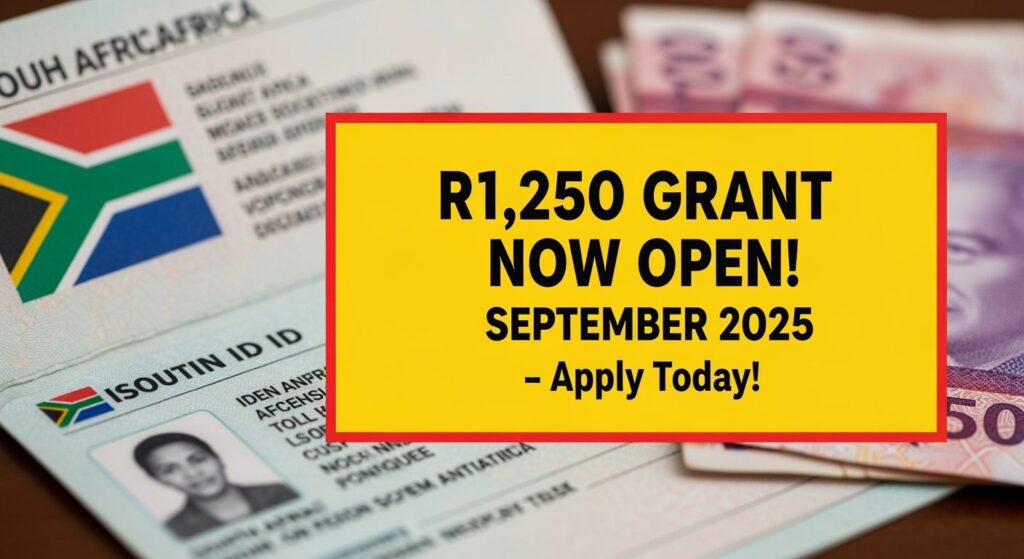Foster Child Grant Application: If you’re caring for a foster child in South Africa, I have important news for you. The September 2025 application period for the Foster Child Grant is now officially open, with payments set at R1,250 per eligible child. This crucial support system helps caregivers provide for children placed in their care through court orders. As someone who’s guided many families through this process, I understand how vital these funds are for ensuring children receive proper care, education, and basic necessities. Have you been wondering about the application process or whether you qualify? Let me walk you through everything you need to know about the Step-by-Step September 2025 Application for the R1,250 Foster Child Grant.

What is the Foster Child Grant?
The Foster Child Grant is a monthly payment provided by the South African Social Security Agency (SASSA) to individuals who have been legally appointed as foster parents through a court order. This grant aims to assist with the costs of raising a child who is not biologically yours but has been placed in your care. The current payment amount of R1,250 per month per foster child helps cover essential expenses like food, clothing, education, and healthcare. The grant continues until the child turns 18, unless the court order specifies otherwise or is extended for educational purposes. It’s important to understand that this is not an adoption subsidy but rather financial support for temporary care arrangements formalized through the legal system. The Step-by-Step September 2025 Application process ensures that legitimate foster parents can access this crucial support.
Why Apply for the Foster Child Grant?
Raising a child comes with significant financial responsibilities, and when you open your home to a foster child, these costs can create additional strain on your household budget. The R1,250 monthly grant provides essential financial relief that helps ensure foster children receive proper care and opportunities. Beyond the monetary aspect, applying for the Foster Child Grant officially recognizes your role as a caregiver within the social welfare system, potentially opening doors to additional support services and resources. For many foster children who have experienced trauma or instability, this grant helps create a stable environment where they can thrive. The funds can be directed toward educational expenses, extracurricular activities, therapy, or other specialized needs that might otherwise be unaffordable. By taking advantage of the Step-by-Step September 2025 Application period, you’re ensuring continuous support for the child in your care.
How to Apply for the Foster Child Grant
The application process for the Foster Child Grant has been designed to be straightforward, though it does require specific documentation and attention to detail. First, visit your nearest SASSA office with the required documents: your South African ID, the child’s birth certificate, the court order confirming foster care placement, and proof of your bank details. A SASSA official will help you complete the application form and verify your documents. You’ll need to provide information about your personal circumstances, the child’s background, and confirm that you are indeed the court-appointed foster parent. After submission, SASSA typically processes applications within 90 days, though many are approved more quickly. You’ll receive notification of the outcome via SMS or letter. If approved, payments will be backdated to the application date, ensuring you don’t lose out on any entitled funds.
- Bring original ID document and certified copies
- Court order must be current and valid
- Bank account must be in the applicant’s name
- Proof of residence may be requested in some cases
When to Renew Your Foster Child Grant
Understanding the renewal process is just as important as the initial application. Foster care orders and the associated grants typically expire after two years, requiring renewal to maintain continuous support. I recommend starting the renewal process at least three months before the expiration date to avoid any interruption in payments. The renewal requires a court review of the foster care arrangement, so you’ll need to work with your social worker to prepare the necessary reports and documentation. The court will assess whether the foster care arrangement remains in the child’s best interest and may extend the order accordingly. Once the court extends the order, you must submit the updated court documents to SASSA to ensure the grant continues. Mark your calendar for these important dates, as missing the renewal window could mean reapplying from scratch, potentially creating a gap in financial support for the child in your care.
 Youth Support R12,500 Grant September 2025 – Young South Africans Can Apply From This Week
Youth Support R12,500 Grant September 2025 – Young South Africans Can Apply From This Week
Real-Life Success Story
I recently worked with Maria, a grandmother who became the foster parent to her three grandchildren after her daughter passed away. Initially overwhelmed by the paperwork and process, Maria was hesitant to apply for the Foster Child Grant. With guidance through the Step-by-Step September 2025 Application process, she successfully submitted all required documents and was approved within 45 days. The R1,250 per child (totaling R3,750 monthly) has made a significant difference in her ability to provide proper nutrition, school supplies, and even extracurricular activities for the children. Maria shared that without this grant, she would have struggled to meet the children’s basic needs while living on her pension. Her story highlights how the Foster Child Grant serves as a crucial safety net for families stepping up to care for children in need.




